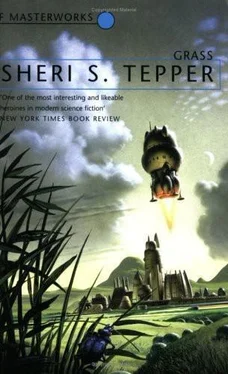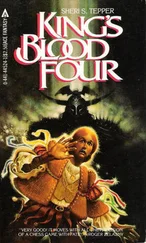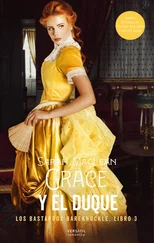Sheri Tepper - Grass
Здесь есть возможность читать онлайн «Sheri Tepper - Grass» весь текст электронной книги совершенно бесплатно (целиком полную версию без сокращений). В некоторых случаях можно слушать аудио, скачать через торрент в формате fb2 и присутствует краткое содержание. Город: London, Год выпуска: 2002, ISBN: 2002, Издательство: Gollancz, Жанр: Фантастика и фэнтези, на английском языке. Описание произведения, (предисловие) а так же отзывы посетителей доступны на портале библиотеки ЛибКат.
- Название:Grass
- Автор:
- Издательство:Gollancz
- Жанр:
- Год:2002
- Город:London
- ISBN:9781857987980
- Рейтинг книги:4 / 5. Голосов: 1
-
Избранное:Добавить в избранное
- Отзывы:
-
Ваша оценка:
- 80
- 1
- 2
- 3
- 4
- 5
Grass: краткое содержание, описание и аннотация
Предлагаем к чтению аннотацию, описание, краткое содержание или предисловие (зависит от того, что написал сам автор книги «Grass»). Если вы не нашли необходимую информацию о книге — напишите в комментариях, мы постараемся отыскать её.
Grass — читать онлайн бесплатно полную книгу (весь текст) целиком
Ниже представлен текст книги, разбитый по страницам. Система сохранения места последней прочитанной страницы, позволяет с удобством читать онлайн бесплатно книгу «Grass», без необходимости каждый раз заново искать на чём Вы остановились. Поставьте закладку, и сможете в любой момент перейти на страницу, на которой закончили чтение.
Интервал:
Закладка:
“Lots of words in the books, we think, but none that we’ve ever found connected to a carving, no.”
Brother Lourai sighed. It would have been pleasant to study the language of these Arbai, see what they had to think about things, see if it was the same as humans thought about things. There was a noise in the sky, away to the southwest, and his head came up — sniffing as though to smell out the sound the way Joshua always did when he heard something in the woods, like a bear, like a deer — peering into the clouds. “I hear an aircar.”
“Them from Opal Hill, I guess,” said Brother Mainoa. “I wonder what they wanted to see this place for.”
Marjorie, aloft in the car, was wondering the same thing. It was Rigo who had wanted to meet the Green Brothers, Rigo who had felt they might have useful information. Now, however, Rigo had no time to follow up any such idea. These days Rigo had time for nothing but riding.
Marjorie had volunteered to find out if the Brothers knew anything useful, but it was the invaluable Persun Pollut who suggested that if she wanted information she should stay away from the Friary.
“They’ve got a kind of committee there,” he had said, “an office. Acceptable Doctrine, it’s called. Everyone on the committee is mostly concerned about what people believe. They’re running things, too; don’t let them tell you they aren’t. Truth doesn’t enter in. If they’ve decided something is doctrine, they’ll ignore all evidence to the contrary and lie to your face. You don’t want to run afoul of those types, do you? Not if you have questions to ask. No. Better for you to meet some of the more sensible ones. I’ve met Brother Mainoa, now, when he’s come into the port for one thing and another. He’s just as down-to-earth as any one of us commons. If there’s any health problems among the Brothers, he’ll tell you.”
“How do I meet Brother Mainoa without involving the — the committee?” Marjorie asked.
“You might just ask to tour the Arbai ruin,” Persun suggested. “He’s usually there, and nine chances out of ten they’d send Brother Mainoa to guide you in any case. Mostly because the rest of them don’t want to be bothered.”
“I might ask to see the ruins at that,” she admitted, deciding after a moment’s consideration that it made good sense to do so, as well as offering a chance at amusement. There had been little amusement for any of them thus far on Grass.
Hungry for some family affection and fun, she packed an enormous lunch and asked the children if they would like to see the ruins. Tony said yes. Stella said no, she was tired, though what she had to be tired of, Marjorie couldn’t imagine. Though she believed she was aware of every emotion the girl felt, Marjorie had no notion that Stella spent each night riding endlessly across the simulated prairies of Grass, creeping down the stairs to ride the Hippae machine every night while the rest of the family was asleep, retreating to her bedroom only when dawn came. Stella had told no less than the truth when she said she was tired. Only the resilience of youth helped her give the appearance of normalcy.
So Tony and Marjorie had determined to make a party of it. At the last minute, however, Father Sandoval had asked if he and Father James could go along, and so there were four of them in the over-ornamented aircar piloted by Tony with reasonable proficiency, considering he had flown the thing only a dozen times. As they approached the ruin, a misty rain began to fall, fading all the colors of the landscape into indistinct grays. When they landed they were met by two of the green-clad Brothers, an old fat one with interested eyes and a young skinny one with a tight cap of brown, curly hair, and a sad, drawn expression. When the old one saw Father Sandoval, he blinked as though he recognized — what? A colleague? An age-mate? Someone who might be expected to be sympathetic? Or antagonistic?
“Religious?” asked Brother Mainoa. “Are you, sir, a religious?” He reached a hand toward the priest’s collar, turning it into a palm-up gesture of supplication. “You and the other gentleman?”
Father bent his thin shoulders and cocked his head, nodding, as though to ask why this minion of Sanctity should care, perhaps slightly offended.
“We are Old Catholics,” Father acknowledged. “This is Father James. I am Father Sandoval.”
“Look at them, Brother Lourai!” demanded Brother Mainoa. “Old Catholics. Now there are ones who chose their life. Not like us.” He winked at the older priest, cocking his head to a similar angle. “Brother Lourai and I, we were given, Father. Given to celibacy. Given to silence. Given to boredom. We had nothing at all to say about it. And when we couldn’t tolerate what we were given to, why, then we were sent here, for punishment.”
“I had heard something of that,” admitted Father Sandoval, not unsympathetically. “His Excellency the ambassador told me something of the kind.”
“I ask you to keep it in mind, Father. As we progress. With your tour…” He bobbed his head, chuckled, then turned and led them away. The rain had stopped. All around them the velvet turf was jeweled with droplets. Mainoa’s feet made dark tracks across the gemmed surface.
Father Sandoval looked questioningly at Marjorie. She shrugged. Who knew what the old man meant? He seemed to be amused by the idea of digging up an Arbai city as punishment, though she might have misunderstood. Only Father Sandoval had been introduced by name, but perhaps it didn’t matter. Perhaps the guides already knew who she was, who Tony was. As for them, the old one was Mainoa, no doubt, and he had called the other one Brother Lourai. Enough to begin with. She gestured the priest forward and followed him, Tony trailing behind her, his head swiveling as he tried to see everything at once.
The ruin was set in an area of violet grass, like soft fur upon the soil. Dug into this were sprawling trenches reached by a flight of stairs made out of ebon stems, the stout bundles staked into position, their tops flat, their stems rubbing together beneath the weight of feet to make a sound like a reprimand.
“Take off your shoes,” they seemed to say. “This is death’s ground. Show respect.”
It was as though the visitors heard the words. Almost, Tony knelt to take off his shoes, feeling his knees bend, coming to himself with a start, shamefaced. Father Sandoval crossed himself with an expression of alert surprise and anger. Father James reached out as though to catch himself from falling. Marjorie looked bemused, wondering. She had heard voices!
Brother Mainoa looked at them and chuckled. “You heard that? I hear it, too, and so does Brother Lourai here. Elder Brother Fuasoi doesn’t hear it, or says he doesn’t. You’re angry, Father? Thinking somebody’s playing tricks? I cut those grass bundles myself, Father Sandoval. No trickery to it. I just walked out into the prairie until I found a stand of grass thick enough, then I cut them and bundled them and put them down there with strips across the top to hold them flat. And I hear voices when people step on them, and you hear things when you step on them, but others don’t. Keep that in mind, Fathers, ma’am, young sir.”
The shallow flight of stairs led to a street paved in stone. Where had the builders found stone among these interminable prairies? And yet stone it was, glistening in the fall of light rain, still polished after buried centuries. The stone was interrupted at intervals by curbs and pediments surrounding open spaces in the pave.
“There were trees here.” Brother Mainoa gestured upward. They looked up, feeling the shadow of moving branches, hearing the rustle of leaves. Marjorie’s eyes widened. There were no trees. Only the empty plots. And yet she had seen, heard the sounds of foliage, the movement of leaves…
Читать дальшеИнтервал:
Закладка:
Похожие книги на «Grass»
Представляем Вашему вниманию похожие книги на «Grass» списком для выбора. Мы отобрали схожую по названию и смыслу литературу в надежде предоставить читателям больше вариантов отыскать новые, интересные, ещё непрочитанные произведения.
Обсуждение, отзывы о книге «Grass» и просто собственные мнения читателей. Оставьте ваши комментарии, напишите, что Вы думаете о произведении, его смысле или главных героях. Укажите что конкретно понравилось, а что нет, и почему Вы так считаете.












